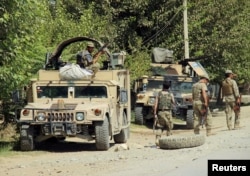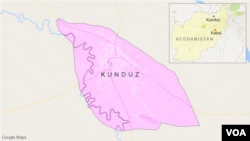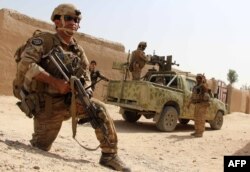The United Nations says it is deeply concerned about the rapidly deteriorating humanitarian situation for civilians still trapped in the conflict-hit northern Afghan city of Kunduz, while thousands of others have fled their homes with few possessions.
Street-to-street fighting for control of the crucial Afghan provincial capital continued for a fourth day Thursday, after Taliban insurgents staged a multi-pronged offensive earlier this week.
Afghan forces backed by U.S. military airstrikes have been attacking insurgent positions to evict them, but officials say the operations are being conducted carefully to avoid collateral damage. They allege Taliban fighters are using civilian homes as shields. Clashes were reportedly also taking place in parts of central Kunduz.
There have been dozens of civilian casualties while Afghan forces and the Taliban also claim to have inflicted heavy losses on the other side, but no exact figures or details are available because of communication disconnections and lack of access to the city.
A spokesman for the U.S.-led military coalition says Afghan forces are defeating Taliban attempts to take Kunduz and their commando units “continue to clear isolated pockets of Taliban” in the city.
The hostilities come despite repeated claims by government forces backed by the U.S. military’s advisors and air power that they have pushed the insurgents to the edges of Kunduz.
Initial reports suggest that up to 10,000 individuals fleeing the fighting have in recent days arrived at locations including Taloqan, Mazar-i-Sharif and Kabul, the national capital.
Many of these refugees left suddenly and are carrying few possessions, said the United Nations Office for the Coordination of Humanitarian Affairs (UNOCHA) in Afghanistan.
“Families trapped in Kunduz city are facing water shortages, power cuts and are finding it increasingly difficult to source food and fuel, and when they do, it’s at inflated prices. In addition, with many health clinics shut or running with reduced staff, there is limited access to essential health services,” said Dominic Parker, head of the UNOCHA.
A senior doctor at the city’s 200-bed main public hospital, Abdul Hameed Alam, told VOA that several rockets and small arms fire hit the facility during overnight clashes, forcing all the doctors and other staff to abandon their work and flee for safety.
Since then, he says, medical units of the Afghan army have been trying to provide assistance at the hospital to more than 150 people sustaining conflict-related injuries.
The doctor disclosed that since the fighting erupted, the hospital has treated and discharged more than 200 wounded people, but declined to share the number of fatalities.
An American airstrike mistakenly destroyed the city’s well-equipped trauma center run by Medecins Sans Frontieres (Doctors Without Borders) when Taliban militants assaulted and briefly captured Kunduz exactly one year ago. Hospital staff and patients were among 42 people killed.
Meanwhile, a government spokesman in the southern Helmand province told VOA that overnight coalition airstrikes killed nearly 90 insurgents, including several commanders, enabling Afghan forces to repel a major Taliban assault on the provincial capital of Lashkar Gah.
The Islamist insurgency has kept the city under pressure since capturing key districts around it in addition to overrunning other areas in Helmand in recent months.
In the wake of intensified hostilities in Afghanistan, U.N. officials estimate that nearly 280,000 individuals have fled their homes as of early October. They have warned that by the end of this year, more than 1 million people will be on the move in Afghanistan, including Afghan refugees returning home in large numbers from Pakistan and Iran.
The U.N. refugee agency says that within the past five weeks alone, more than 100,000 Afghans have gone back to Afghanistan and the number is growing by the day.







